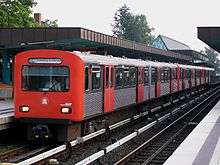Hamburg U-Bahn Type DT2
| HHA-Baureihe DT2 | |
|---|---|
 DT2-E in Farmsen station, displaying an U4 line destination | |
|
Interior of a refurbished DT2 unit | |
| In service | 1962-2015 |
| Manufacturer | LHB/Kiepe |
| Constructed |
1960 (prototype) 1962-1966 |
| Entered service | 1962 |
| Refurbishment | 1984-1992 |
| Scrapped | 1993, 2004-2006, 2016 |
| Number built | 186 units |
| Number in service | 0 units |
| Number preserved | 1 units |
| Number scrapped | 185 units |
| Fleet numbers |
originally: 9100–9471 later: 601-791 |
| Capacity | 82 seats, 106 standing |
| Operator(s) | Hamburger Hochbahn AG |
| Depot(s) | Farmsen |
| Line(s) served |
1962-2005 2005-2015 |
| Specifications | |
| Train length | 29.44 m (96 ft 7 in) |
| Width | 2.51 m (8 ft 3 in) |
| Height | 3.35 m (11 ft 0 in) |
| Doors | 8 per unit, 4 per car |
| Maximum speed | 70 km/h (43 mph) |
| Weight | 34.4 t (33.9 long tons; 37.9 short tons)[1] |
| Power output | 320 kW (430 hp) |
| Acceleration | 0.8 m/s² |
| Electric system(s) | 750 V DC |
| UIC classification | Bo'2'Bo' |
| Braking system(s) | Dynamic main brakes |
| Safety system(s) | Sifa |
| Coupling system | Scharfenberg |
| Track gauge | 1,435 mm (4 ft 8 1⁄2 in) |
The Type DT2 is a two-car electric multiple unit train built for the Hamburg U-Bahn. The prototypes were introduced in 1960 and with almost 200 units the DT2 was the most common train type of the Hamburg subway system, especially the U2 and U3 lines, until the 1990s.[2]
Description
The body was created in lightweight steel construction, licensed by the American Budd Company, whereby the mass of the vehicles could be reduced compared with the DT1. A DT2 also have a lower power consumption compared to a DT1 because of their weaker engine. The DT2 trains are all-electric cars and therefore cannot be coupled with a DT1 or a DT3. Five series were delivered from 1962 to 1966.
Refurbishment
From the 1980s until the early 1990s, the fourth and fifth DT2 series were refurbished. They received a new front (with one window instead of three and new headlights) since the old ones were susceptible to rust and showed structural issues just as the rest of the bodies as their lifespan was only planned to be about 20 years. Because of the refurbishment the units could be used for another 20 years. The rebuilt units were called DT2-E. The other units only received a small interior refurbishment and were retired until 2002. The third DT2 series was retired in 1993 already without any refurbishment as those units showed some technical differences to the rest of the fleet which made maintenance expensive and difficult.
Operation
Until 2004, the DT2s were mostly used on the U2 and U3 line. Most of the units were retired until 2005 after being replaced by the last DT4 trains. After that 10 units were kept as an operational reserve and five more units in case the reserve would be too small. All 15 units came into service again for the 2006 FIFA World Cup, after that all 15 units were taken out of service again. Operationless preservation ended in 2008 when they received a small technical refurbishment to serve the U1 line during the peak hours. In the first half of 2009, the DT2s were used again on U2 and U3 line due to construction works on the U2 line.
The DT2 trains never received station announcements and CCTV cameras in the interior, which should be installed in each subway car according to statements of the Hamburger Hochbahn AG.[3] After the first of many announcements of a DT2 retirement in 1988, the last units made their final trip on the U1 on 27 November 2015, followed by a farewell ride through the entire network on 28 November 2015. They were replaced by the new DT5 trains. One original unit will be preserved for heritage tours. The last units were scrapped in Lübeck in May and June 2016.
References
- ↑ Technical Data on the official Hochbahn web site
- ↑ de:HHA Typ DT2 Translation from the German Wikipedia article.
- ↑ Press information, 3 January 2008 (German)
External links
| Wikimedia Commons has media related to HHA Type DT2. |